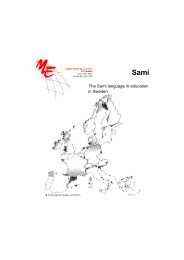Multilingual Early Language Transmission (MELT) - Mercator ...
Multilingual Early Language Transmission (MELT) - Mercator ...
Multilingual Early Language Transmission (MELT) - Mercator ...
Create successful ePaper yourself
Turn your PDF publications into a flip-book with our unique Google optimized e-Paper software.
5.1.1. Quality of language input<br />
The ELIAS (<strong>Early</strong> <strong>Language</strong> and Intercultural Acquisition Studies 99 ) project published two<br />
volumes 100 including results of a longitudinal study on bilingualism in European (pre- and<br />
primary 101 ) schools and best practices in bilingual pre-schools, where a foreign language is<br />
taught from kindergarten to secondary school.<br />
One of the ELIAS project’s aims was to investigate the nature of language input provided in<br />
bilingual pre-schools by pre-school teachers. The assumption that quality of language input<br />
matters to second language acquisition of children was made. As a result of an “Input<br />
Quality Observation Scheme and Grammar Test Development over time” 102 the analyses<br />
show that input quality significantly correlates with the amount of progress in receptive<br />
second language grammar knowledge. For the quantitative side of language input there<br />
were no significant differences found between the low and high input intensity groups as to<br />
grammar development (Kersten, 2010).<br />
The <strong>MELT</strong> partners had the same experience as regards providing a good language input by<br />
pre-school teachers. Even though in the ELIAS project the focus was on learning a second<br />
foreign language and the <strong>MELT</strong> project mainly focuses on pre-school in the minority<br />
languages. In the <strong>MELT</strong> project practitioners concluded, that while working with young<br />
children, it is necessary to repeat words and phrases over and over again and in different<br />
contexts, before a child understands and later on uses the words and concepts by<br />
themselves.<br />
5.1.2 Guidelines for pre-school practitioners<br />
The ELIAS project developed guidelines for language use in bilingual preschools for children<br />
aged 3 to 6 years. These seven guidelines are a kind of theoretical strategies for language<br />
input for bilingual pre-school teachers. The ELIAS guidelines are:<br />
1) The teacher uses the L2 in a way that the children receive rich and varied L2 input;<br />
2) The teacher needs to contextualise the L2;<br />
3) The teacher adapts speech patterns for the benefit of the child's understanding;<br />
4) The teacher creates an environment which promotes multi-sensory learning;<br />
5) The teacher provides the children with ample opportunity to interact verbally and to<br />
express themselves (verbally and non-verbally);<br />
6) The teacher provides scaffolds to support the children's learning;<br />
99<br />
The ELIAS project (2008-2010) has been funded with support from the European Commission, Multilateral EU-Comenius Project. Project<br />
partners include ten bilingual preschools in Germany, Belgium, England and Sweden, a monolingual English preschool in the UK, as well as<br />
eight Universities and the Zoological Garden in Magdeburg, Germany, which carried out the scientific research. For further information on<br />
the ELIAS project: www.elias.bilikita.org [Accessed May 2011].<br />
100<br />
Kersten, K. et.al (eds.) (2010). Bilingual Preschools Volume 1 Learning and Development. And Bilingual Preschools Volume 2 Best<br />
Practices. Trier: WVT Wissenschaftlicher Verlag Trier.<br />
101<br />
They cover the age range of 3;0-18;00. In this project children aged 3 to 6 years are attending pre-school, primary school starts in this<br />
project at age 6.<br />
102<br />
Weitz et al. (2010). In: Kersten, K. et.al (eds.) (2010). Bilingual Preschools Volume 1 Learning and Development. Trier: WVT<br />
Wissenschaftlicher Verlag Trier.<br />
69



